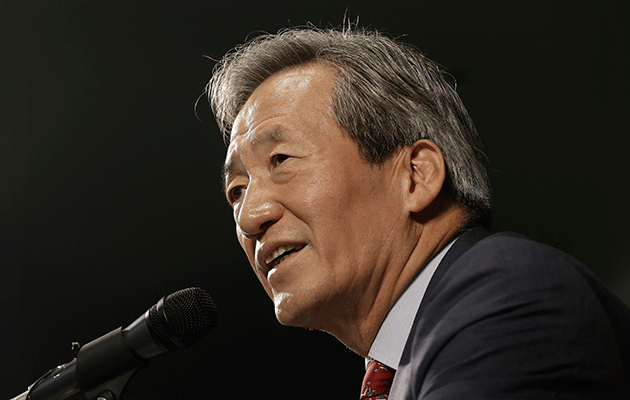In an explosive statement of justification and self-defence, FIFA presidency contender Chung Mong-joon has accused the world federation and its Ethics Committee of flouting the basic standards of natural justice.
The billionaire South Korean, as he acknowledged, faces an imminent 15-year suspension from all football which would wreck his bid to outflank UEFA president Michel Platini and Prince Ali of Jordan in pursuit of the leadership of the world game; embattled current president Sepp Blatter will stand down at an election congress in Zurich next February 26.
But the claims he raised in a statement, on which he is set to expand tomorrow in London at the Leaders Sport Business Summit, are so serious as to raise important questions about the credibility of the ethics process and the ‘confidentiality’ rules constructed around it by FIFA in the first place.
Chung complained bitterly and angrily, in effect, that the cause of justice cannot be served when it cannot plainly be seen to be done.
A core feature of Chung’s anger was that he believed he had become a ‘marked man’ among leaders of the world football federation because, during his 17 years as FIFA’s Asian vice-president, he challenged presidents Joao Havelange and then Blatter over financial and corporate mismanagement.
He also attacked unnamed sources in both FIFA and the Asian Football Confederations for “malicious” leaks to the media concerning his ethics committee case in which he is accused over activities during the controversial 2018-2022 World Cup bid process.
South Korea, co-host with Japan in 2002, was bidding alone for the 2022 tournament which was awarded, eventually, to Qatar.
Chung said: “I am disappointed but not surprised. From the beginning, it was clear that the Ethics Committee was undertaking this so-called ‘investigation’ to prevent me from running for president of FIFA.
“Ever since I announced my candidacy, numerous leaks of confidential information from the Ethics Committee have been made to the press.”
He had kept silent about the investigation “out of respect for the confidentiality requests from the FIFA Ethics Committee” but now felt it was time “to set the record straight.”
Chung recounted his initial clash with Havelange, one year after joining the exco, over the issue of transparency. Latest he ascribed Havelange’s anger to the fact that the Brazilian “from 1992 to 2000, was paid $50m in bribes by a company named ISL.” He also recounted the incident of the infamous ISL cheque addressed to Havelange and returned to ISL by Blatter, then general secretary.
Chung said: “Mr Blatter should have been given a life-time ban. If they had, FIFA would not face today’s crisis.”
Referring to events of the last weeks he complained that “unlike Mr Blatter, Mr [Jerome] Valcke [suspended secretary-general] and Mr Platini, I am not facing any allegations of bribery, fraud, corruption, or conflict of interest.”
Chung also insisted that, “contrary to the media speculation based on leaks, there is no ‘probe ‘against charitable donations that I made to Haiti and Pakistan in the past.”
The main charges laid against him by the Ethics Committee had concerned vote-trading with England (subsequently dropped) and a proposal for a $777m ‘global football fund’ in support of the Korean World Cup bid.
This, Chung insisted, was “perfectly in line with the football development projects that FIFA asked every bidding country to propose as part of their bid requirement.” It had even been investigated and cleared by Valcke.
He compared it with England’s Football United fund which was described as “a unique chance to create a new global fund for football that aims to match FIFA’s current spend on football development . . . imagine what this would mean for your confederation.”
Chung deduced that “the fundamental reason why I am being targeted is that I aimed straight at the existing power structure of FIFA.” He queries as to why no disciplinary action had been taken against Blatter and Valcke over the $90m cost of settling the Visa-MasterCard sponsor switch debacle.
He also attacked the Ethics Committee handling of a case concerning Harold Mayne-Nicholls, who led the World Cup bid technical assessment panel as “a travesty of justice.”
Continuing his attack on the ethics system, Chung complained that his request to call Blatter and Valcke as witnesses had been denied; he noted that no inquiry had been made concerning Platini’s vote for Qatar and the Frenchman’s son subsequently being employed by a Qatari-owned company; and that the main charge against him was based on a regulation not introduced until 2012 i.e was retrospective legislation comtrary to natural justice.
Nevertheless he concluded, optimistically: “Ultimately, I will prevail and will be vindicated. But with the tactics employed by the Ethics Committee and its complete disregard for due process, justice will not be served at the Ethics Committee hearing and my candidacy will be jeopardised.
“The true danger is that they are not only sabotaging my candidacy. They are sabotaging FIFA’s election and FIFA itself.”
In an additional paper, Chung launched a personal attack on Blatter’s FIFA leadership style and warned: “FIFA is much sicker than it looks.” The fact that he felt himself under direct attack from within the organisation, he thought, was “the best proof that I am the person to lead FIFA’s reforms.”
The Ethics Committee was approached about Chung’s claims but maintained its standard practice of not commenting on ongoing investigations.
If Chung is about to be hit with a suspension the legal situation could become even more confused. This is because the FIFA presidency nominations deadline is October 26 and contenders have to be vetted by . . . the Ethics Committee.
Hence, if Chung wished to maintain his presidency bid he should appeal immediately to the Court of Arbitration for Sport and seek to have any suspension set aside pending a full hearing. The Ethics Committee would then face a delicate judgment over whether a man it is seeking to punish is a ‘fit and proper person’ to enter the election campaign.







